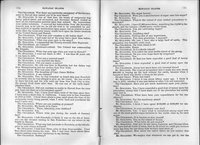594-595
| Previous Page | Next Page |

|
The Chairman. Was there any particular emergency of the Government in Hawaii that caused you to be sent there?
Mr. Spalding. It was at that time the treaty of reciprocity was being talked about and advocated, and Secretary Seward wished to have all the information possible upon that subject. My instructions were rather indefinite. I received my instructions from the Secretary himself, and, as he told me, he did not wish to be committed by putting explicit or specific instructions upon paper, but he wished to know what effect the reciprocity treaty would have upon the future relations of the United States and Hawaii.
The Chairman. What was your vocation in life before that?
Mr. Spalding. I had come out of the army but a short time before.
The Chairman. What was your rank in the army?
Mr. Spalding. I commanded the Twenty-seventh Ohio Regiment.
The Chairman. As Colonel?
Mr. Spalding. Lieutenant-colonel. Our Colonel was commanding the Brigade.
The Chairman. What was your age when you went to Hawaii?
Mr. Spalding. I went out there in 1867. I was then 30 years old. I was born in 1837.
The Chairman. Were you a married man?
Mr. Spalding. 1 was married out there.
The Chairman. Did you marry a native?
Mr. Spalding. My wife was born in Honolulu, but her father was from Massachusetts and her mother from New York.
Senator Frye. Who was your wife?
Mr. Spalding. The daughter of Capt. James McKee.
The Chairman. A sea captain?
Mr. Spalding. Yes; he was wounded on board ship near Honolulu so severely that he was obliged to give up his vessel. He was unable to leave his bed, and his wife went out from New York City to him. He always lived there after that. He was one of the early sugar-planters there.
The Chairman. Did you continue to reside in Hawaii from the time you went out there as a Government agent?
Mr. Spalding. Yes; I have lived there most of the time since then. I have been a short time in California. I came over to San Francisco in 1875 or 1876. I lived there about a year, until about the time of the reciprocity treaty being passed, when I went back and purchased the land I have now.
The Chairman. Where are you residing at present?
Mr. Spalding. My family is in Paris.
The Chairman. There, educating your children?
Mr. Spalding. Yes.
The Chairman. Where were you during the month of January last?
Mr. Spalding. I left Honolulu—I think it was on the 4th of January— on the steamer coming to San Francisco—on my return to my family in Europe.
The Chairman. What stay had you made in Honolulu, on the islands, prior to your return to Paris?
Mr. Spalding. I had been there, prior to that, three months. I had been there twice during the year. But I had been there about three months putting some new machinery in my factory.
The Chairman. Refinery?
|
Mr. Spalding. No; sugar factory.
The Chairman. Were you a manufacturer of sugar cane into sugar?
Mr. Spalding. Yes.
The Chairman. What is the extent of your landed possessions in Honolulu?
Mr. Spalding. I have 27,000 acres there; something like 12,000 in fee simple, and the balance—15,000 acres—under lease.
The Chairman. You are cultivating sugar?
Mr. Spalding. Yes.
The Chairman. Anything else?
Mr. Spalding. Nothing else of any importance.
The Chairman. You raise provisions, I suppose?
Mr. Spalding. Oh, yes; I have also a large herd of cattle. This plantation was formerly cattle land.
The Chairman. On what island is it?
Mr. Spalding. Kauai.
The Chairman. Is it a fertile island?
Mr. Spalding. It is called the most fertile island of the group.
The Chairman. Do you raise crops there by irrigation?
Mr. Spalding. Yes.
The Chairman. So that you have expended a good deal of money there?
Mr. Spalding. I have expended a good deal of money upon the plantation.
The Chairman. About how much have you invested there?
Mr. Spalding. The original investment that I made was only about $60,000 in buying up the land without the cattle, because when I bought it there was hardly a fence on the place.
Senator Gray. When was that?
Mr. Spalding. I think it was about fifteen years ago. I think it was in 1878; whether it was just before or after, I do not remember.
The Chairman. Have you put much machinery upon your plantation?
Mr. Spalding. Yes, I have expended a good deal of money upon the plantation; money that I have made out of the plantation has mostly gone into it.
The Chairman. What have been your expenditures for the machinery?
Mr. Spalding. For the machinery alone?
The Chairman. Yes.
Mr. Spalding. I think I have spent $250,000 or $300,000 for machinery.
The Chairman. Is your machinery very fine?
Mr. Spalding. Yes. I have what is considered among sugar men one of the most perfect sugar factories in the world—that is, for cane sugar.
The Chairman. It is located on this island?
Mr. Spalding. Yes, on the island of Kauai.
The Chairman. What labor do you employ?
Mr. Spalding. Just now we are using Japanese and Chinese labor. We have had all kinds of labor, that is, all kinds we could get, because labor has been the one thing that we have been short of.
The Chairman. How about the native labor; do you employ that also?
Mr. Spalding. We employ that whenever we can get it; but the
| Previous Page | Next Page |